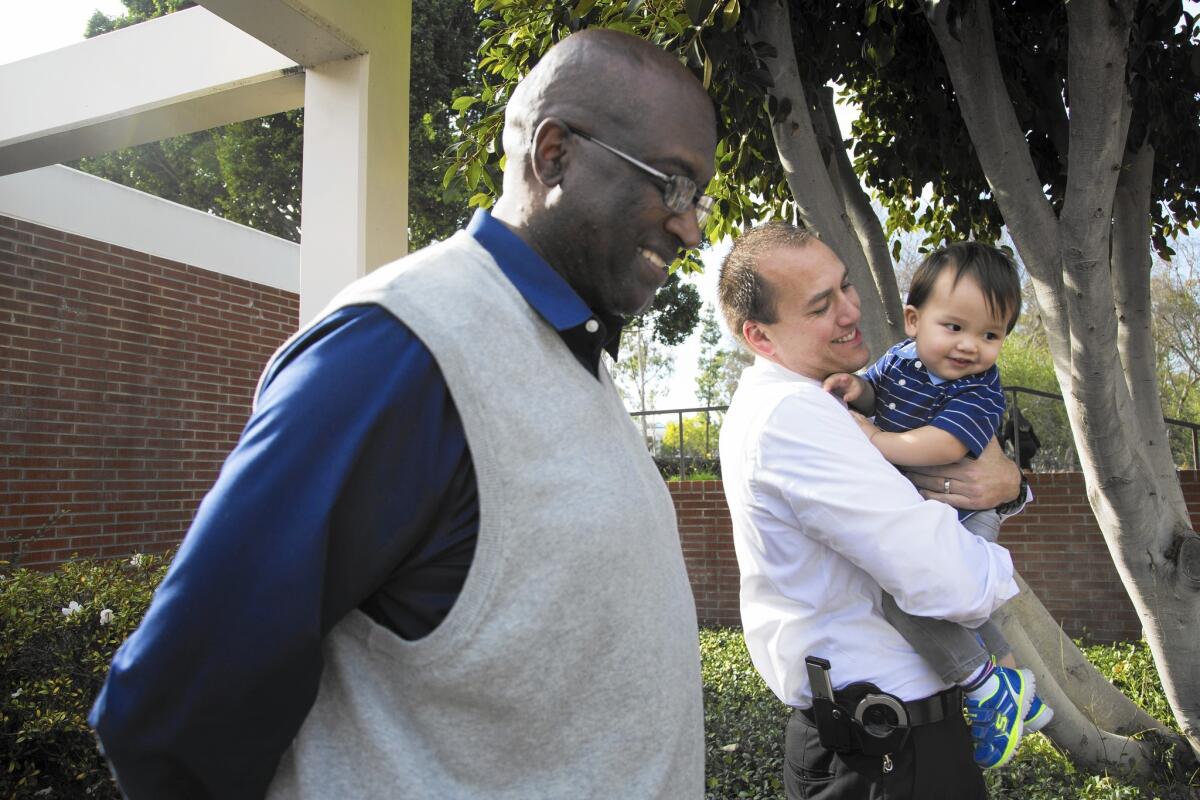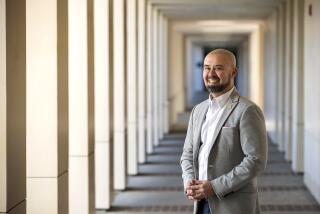On social media, alums thank Cal State faculty who changed their lives

- Share via
Christopher Schivley was poor, alienated and desperately seeking guidance when he enrolled in a career education class as a freshman at Cal State Long Beach.
Instructor Emmitt Clark grew up in the Chicago projects as the son of a single mom, dodging gangs and drugs on his way to a teaching career.
Clark’s classroom stories of survival and overcoming the odds deeply impressed Schivley, who saw in his instructor’s background shadows of his own struggles.
The young student resolved to emulate Clark’s resilience and compassion as he matured. He became a mentor to several young men in a church youth group, who themselves grew up to succeed in life.
Nearly 20 years after that first class, the connection made then is freshly on the minds of both men, after Schivley, now a captain with the Cal State Long Beach Police Department, recently shared his story in an online tribute to Clark.
Clark, Schivley wrote, was much more than just inspiring. “You were my support, my friend, my counselor and my mentor.”
And he saved the best for last:
“I continue to use the lessons that you have taught me in everything I do as a police captain, mentor and father to my new baby boy, Emmitt.”
Both he and his wife agreed it was a worthy honor for Clark, Schivley, 36, said in an interview.
“I really was in a place in life where I needed someone to be an example to look to, to be the person I wanted to become. It was my way of saying thank you for all you’ve done,” said Schivley, whose son is now a year old.
Clark, 62, said he was overwhelmed by the gesture.
“It’s, like, wow, sometimes you look at things like that and almost feel guilty,” said Clark, director of professional development and internships for the College of Engineering. “It was nothing special, just going into the classroom doing what I was supposed to do. Hopefully, you can hit a home run with a few of the students.”
The #thankscsu appreciation is part of Cal State’s celebration and its effort to reach 3 million alumni.
An online yearbook has been created and graduates invited to thank a faculty or staff member who affected their lives and to post it to Facebook, Instagram or Twitter.
The posts reflect the often reverent, complicated and quirky attachment between teacher and student.
“Thank you Jeff Fadiman,” said John Gerbracht, “The only professor whose name from SJSU and Cal State Hayward that I remember.”
Jess Block Nerren wrote: “Shout out to CSUF professor of communications Dr. Ames! I reference what I learned from here in my work every day and am thankful for the opportunity to study under such a brilliant mind!”
“We wanted to create a real chance to allow alumni to express their thanks for faculty and staff in a public way,” said Aaron Moore, director of advancement for the 23-campus Cal State system. “Capt. Schivley’s post was heartwarming and makes you realize there are some great stories out there.”
Schivley initially wasn’t sure he wanted to share his. He never met his father, and his mother suffered from mental illness. He was frequently homeless and largely raised by his grandparents. But school was a refuge, and he got good grades.
He was lucky to land in Clark’s class at a formative period in his life.
“Sometimes you’re just drawn to someone who speaks to you and you’re very comfortable,” Schivley said. “He gave me a target to shoot for, to stay in school, work hard, follow my dreams and don’t give up.”
There wasn’t much inspiration in Clark’s rough neighborhood on Chicago’s Southside, where he grew up with four sisters. His mother pushed him, though, to obtain a solid education, enrolling him in Catholic schools that provided academic training and enforced strong discipline.
He began teaching the career education course at Long Beach in 1990.
“I look back on my experience as a lesson that if I can do it, anyone else can,” Clark said. “I took on that locus of being in control and not being the victim, telling students to be careful with decisions they make and the environments they put themselves in.
“There was no magic wand. Chris was a student who listened. I’m really appreciative of his accolades, but he really took care of business on his own.”
Clark said he’s impressed at Schivley’s work to mentor other young men. One of them, William Van Sickle, remembers being a “jerk little kid” when he hit it off with Schivley, who was volunteering at a youth group.
Van Sickle’s father had died when he was in high school, and Schivley took on a paternal role. His “big brother” kept him out of trouble after Van Sickle joined the Marines out of high school, he said, taking the younger man on drive-alongs during his police shift.
Schivley didn’t talk about Clark right away, but Van Sickle said he sees the influence in Schivley’s constant encouragement, such as when he applied to join Marine Helicopter Squadron One, the unit based in Quantico, Va., that transports the president. Van Sickle, 29, is now a crew chief in the unit.
“Chris is an upbeat guy, and it’s hard not to be uplifted when you’re around him,” said Van Sickle, who deployed three times to Iraq. “I’m taking on that role to mentor Marines beneath me.”
More to Read
Sign up for Essential California
The most important California stories and recommendations in your inbox every morning.
You may occasionally receive promotional content from the Los Angeles Times.














